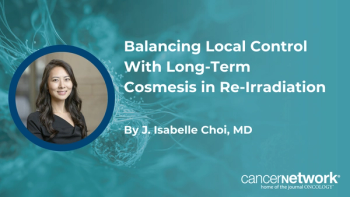
Oncology NEWS International
- Oncology NEWS International Vol 15 No 4
- Volume 15
- Issue 4
CGEMS to ID Genetic Risks for Two Cancers
The National Cancer Institute (NCI) has begun the largest, most comprehensive effort to identify genetic risk factors for two major cancers, a 3-year initiative aimed at deciphering which genetic alterations put people at increased risk of developing breast and prostate cancer.
BETHESDA, MarylandThe National Cancer Institute (NCI) has begun the largest, most comprehensive effort to identify genetic risk factors for two major cancers, a 3-year initiative aimed at deciphering which genetic alterations put people at increased risk of developing breast and prostate cancer. The program, Cancer Genetic Markers of Susceptibility (CGEMS), will engage NCI and outside scientists in scanning the entire human genome to identify common, inherited gene mutations that heighten the risk of developing the two cancers.
NCI has designed the $14 million program to capitalize on new insights into human genetic variation and to take advantage of technical advancements in ultrahigh-throughput genotyping. It will start by screening 2,500 samples obtained from normal men and men diagnosed with prostate cancer to determine which of the more than 550,000 single nucleotide polymorphisms (SNPs) the most common type of genetic variations that occur in humansare related to prostate cancer. Illumina, Inc., of San Diego, will do the rapid genotyping. "The project promises to provide a needed database to support the development of novel strategies for the early detection and prevention of these diseases," said Anna D. Barker, PhD, NCI's deputy director.
Articles in this issue
almost 20 years ago
Phase II Trial of Velcade/Alimta Initiated in Advanced NSCLCalmost 20 years ago
ONS Annual Congress Heralds Start of Oncology Nursing Monthalmost 20 years ago
All-Star Panel Spells Out Onc Promises, Problemsalmost 20 years ago
Surveillance for Colon, Breast Ca Falls Off 5 Years After Diagnosisalmost 20 years ago
ODAC Says No to Gemzar for Ovarian Caalmost 20 years ago
Femara Effective Even After Years of No Therapyalmost 20 years ago
XMRV Retrovirus Found in Some Prostate Ca'salmost 20 years ago
Taxotere Wins FDA Approval for Advanced Gastric CancerNewsletter
Stay up to date on recent advances in the multidisciplinary approach to cancer.












































